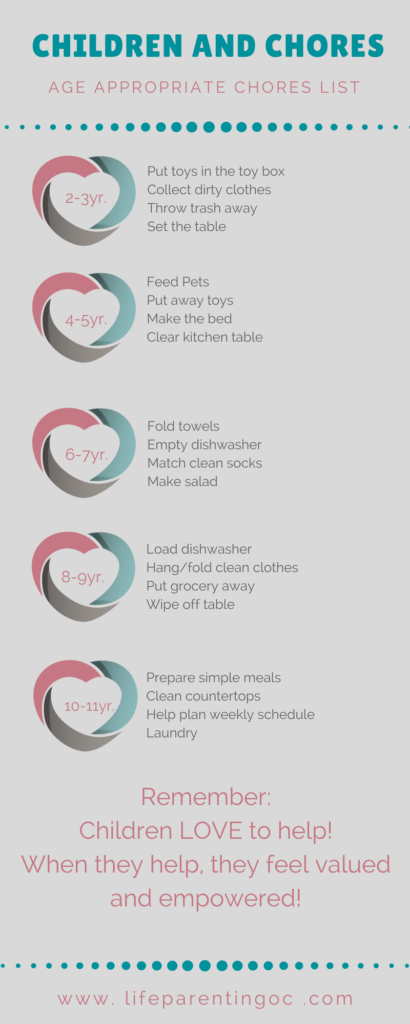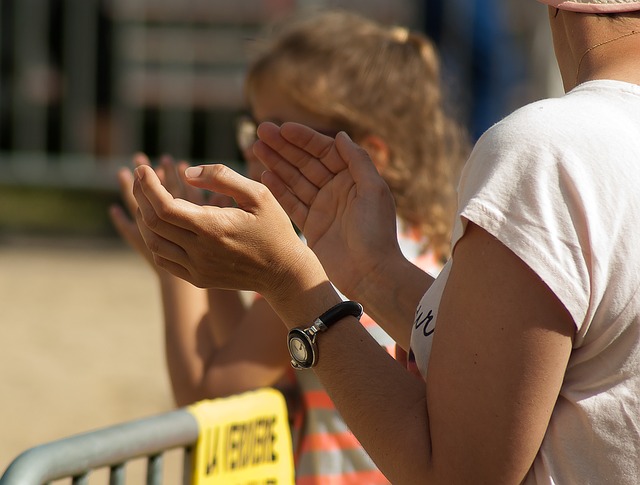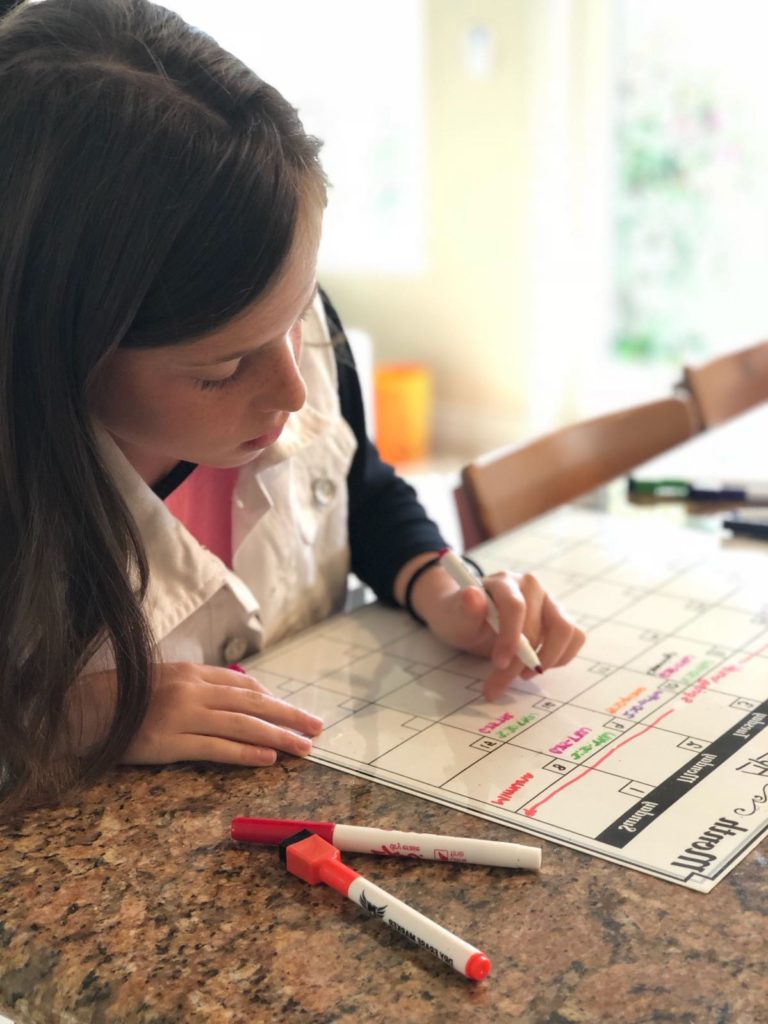When we have a child (or children…) that “push our buttons” often, we tend to focus only on their “bad behavior”.
In the next couple of days, imagine you have a spotlight and with this spotlight I want you to shine on your child’s strengths, his good choices, his kind acts.
And by “shine” I mean – encourage him, give him a good word, acknowledge his effort.
Remind yourself what an amazing job you’ve been doing as a parent.
Sometimes we need to “zoom out” in order to see all the good in our children.
Allow yourself to zoom out.
Use that spotlight.
Author: Life Parenting
Sidelines
When we do our children’s home assignment for them – we are not helping them.
When we buy them everything they ask for – we are not helping them.
When we allow them to stay out late on a school night just because all their friends’ parents let them, when we give them the solution to every problem on their way, when we try to be their friends instead of their parents, when we protect them from every failure or challenge – you guessed right – we are not helping them.
I’m sure that if I’ll ask you what you want your children to be like when they’re 25 years old, most of you would say: independent, responsible, with high self-esteem.
How can they be independent if we pack their school backpack for them when they’re 9 and can definitely do it themselves? Or when we clean up after them on a daily basis?
How can they grow to be responsible when we continuously remind them of every little thing they need to do or remember?
How can they learn to trust themselves to be able to work through challenges when we solve every little problem they have?
How can they learn to be financially responsible when they get everything they ask and want?
Parents, home is the safe place for them to learn and make mistakes, this is where they practice for the future.
We must let them try, fail, feel frustrated and trust them to try again and again until they succeed!
We are there to encourage them and support them, but from the sidelines, not on the field.
They are mine
They are mine and each one shaped my parenting in a whole different way. Together they made me the parent I am today. One taught me that nothing is impossible; one taught me to always keep smiling; one taught me that no challenge is too big or too scary. We teach our kids many things every day, but as the days pass, we need to always think about what they teach us.
Be a Good Sports Parent!

Let the kids have fun while they practice. If you want them to respect and listen to their coach, YOU should respect him. If you want them to learn skills during the practice, take away the pressure. They are kids. Let them have fun and enjoy watching them!
“And Then What?”
Many kids have a hard time when they don’t know the schedule or the plans for the day or even the week.
My kids used to ask me at least million times a day – What are we going to do after you pick us up from school? And then what? And after that? Who will we meet? What are the plans for tomorrow? And for the weekend? I found myself answering these questions over and over (and over…) and I got tired!
I knew that they needed to know because they feel more secure when they know what to expect, but it took a lot of energy (and patience) on my side.
So I decided to try something new – I bought a magnetic dry erase monthly scheduling calendar and a few markers. At the beginning of each month, I sit with my kids and write down all the activities and plans that we have for the month. We use a different color marker for each child so they can tell what are their activities in one glance.
Writing down all the activities not only helps them to see what is coming up, but it also allows them to take an active part in deciding what to do when, understanding time limits and help think of creative solutions when we have conflicts in our schedule. It is also an excellent opportunity to talk about possible plans changes, flexibility and the fact that sometimes we cannot fully control our schedule – it is a vital life skill! Try it!
Children and Chores
Many parents ask me which chores their children can do around the house. I believe that from very young age children can and should be responsible for all kind of chores. And the best thing is that they LOVE to help! It makes them feel valued and empowered! Attached you can find an age-appropriate chores list. Remember – these are just some ideas, you can sit with your children and make a list of chores that they would like to be responsible for. You might be surprised by the ideas that they have!

Homework
“Do you have homework today?”
“Go do your homework.”
“Are you done with your homework?”
“Let’s do your homework.”
“We need to go out in 15 minutes, please finish your homework.”
“It’s getting late, please do your homework, ok?”
“It’s almost bedtime! Go do your homework!!”
Sounds familiar?
During the afternoons, most of the struggles and arguments with school-aged kids are around homework. These arguments affect the relationships between parents and their kids.
So, what can we do?
General Tips for approaching homework
Where? Make sure that they have a quiet place to sit. Put all the supplies they need within reach. This way they don’t need to start looking for a pencil or an eraser every time (which will waste time and while they are searching they will probably find much more interesting things to do instead of homework….)
When? Keeping a steady schedule helps kids know what’s expected of them and when. Try to set a timeframe for doing homework. For example – after the kids return from school, they eat a snack, relax a little bit and then sit to do their homework.
But also...
Give them a choice – let them choose when and where they want to do their homework. They can choose between two options that work for you (before or after the snack, in the kitchen or in the living room etc.) They will feel responsible for doing their homework if they get to choose.
Should I sit with them? Kids in the lower grades often need guidance when doing their homework. They don’t always know how to read well enough to understand the instructions. Parents can guide them and answer questions they have, but we need to keep in mind that we want to develop their independence so that in the future they won’t depend on us while doing their homework. So, try to be around them while they do their homework, but encourage them to think and find the answers by themselves. If you feel they need you closer to them, sit with them and gradually try to stay away. Be nearby doing other things, but let them cope by themselves.
Why is he still arguing about homework?!
Many times, parents tell me they let their child choose when and where to do his homework, all the supplies are ready and yet… he just won’t sit and do them! He keeps postponing, finding better things to do, arguing with them about the homework and most afternoons look like a crazy battle around homework.
In these cases, most of the time it is not even about homework. It’s about the attention he gets from his parents. The child just found a subject to argue with his parents about. He found a way to get their attention. According to the Adlerian approach, the main purpose of every human being is to belong. Belonging to his family, to a group of friends, etc. One way to feel that we belong is by getting attention and being seen. It doesn’t matter if it’s positive attention or negative. If we argue and talk and talk and talk about the homework, we give our child attention. We need to focus on giving our child positive attention. Encourage him. We need to stop giving him attention when he misbehaves. Once we stop, the bad behavior will stop.
So back to his homework…
Think about all the attention we give our child during the afternoons when we argue with him about his homework. Now let’s stop that. Trust your kid. Don’t ask him repeatedly if he did his homework. Let him be in charge. If he will fail once, he will learn that in the future he should try harder.
And when we stop giving attention in one place, we need to give it in another place. Encourage your child on every little thing he does. At first, it might sound fake to you, but you will see how the attention helps.
It is always hard to let go but we need to remember that If we will continue to remind them, they will never learn to trust themselves and be responsible.
Need more help?
Want to hear more about how to improve your relationship with your child?
Sibling Rivalry – Do’s and Don’ts
Do's and Don’ts – Sibling rivalry
As parents, one of our main goals is to teach our kids to be independent and ready for life in the “real world." We need to let them solve their own problems, especially in the safe environment of our home. Every time you take sides, or try to solve their argument “…you set yourself up as an authority and the children learn nothing about co-operating, adjustment or fair play… When left to their own devices, children establish far more equal and just relationships than we can provide for them” (Rudolf Dreikurs, “Children: The Challenge”)
So here are a few Do's and Don’ts:
- Don’t take sides. In most cases, we weren’t there when the argument started, we don’t know the whole story, so we should not take sides.
- Tell your kids that you trust them to solve the issue by themselves.
- Don’t compare your children to one another. In most cases it won’t help, it will only add competition to their relationship which will make it even worse.
- Don’t label your kids. When we label one child as “brave”, in their eyes it automatically means that the others are not. This will increase the competition between them and often they will conclude that one of them is the “favorite” one.
- Enjoy each of your children’s individual talents and successes.
- Give them tasks that requires them to cooperate instead of competing.
- In most cases, they fight and argue to get our attention. Teach them they can get your attention in more positive ways.
- Give each child chores and let them be responsible for completing them. It will help them feel that they contribute to your household and increase their feeling of belonging.
- In the case of violence, you should split them apart and tell them that you will not allow violence in your home. After they chill out they can solve their argument by themselves.
Remember, sibling rivalry is only part of a very complicated relationship. Siblings also love each other, they laugh together, admire each other and they help each other out when in need.
Ready to find out more?
Call us to schedule a session
All Good Things Come to an End…
My parents live far away from us.
They come at least once a year to visit and spend some time with us. Today my mom left after 5 weeks visit.
It's always so hard to say goodbye. I need to remind the kids (and myself...) the famous say by Dr. Seuss:
"Don't cry because it's over. Smile because it happened"...
It is so important to teach them not to be upset because something is over but instead to appreciate what we have and the memories that we made together.
See you soon mommy!
Ready to find out more?
Us Time
A few months ago I noticed a change in my oldest daughter’s mood. I tried to ask her what was wrong and she didn’t say much. It wasn’t that she was sad or acted out.. she was still behaving well like she usually does, and maybe someone else couldn’t tell that there was change, but as her mom, I noticed. I tried to remember if something had happened to her in the last couple of weeks, but couldn’t think of anything. So, instead of trying to figure out WHAT happened, I started to think about HOW I can help her feel better. Since I had no clue, I decided to ask her.
What I heard from her amazed me.
She asked if she could sit with me alone for couple of minutes. So, we did. We sat; she hugged me and said nothing. After a few minutes she asked me when can we have a few minutes alone again.
Then I realized that in our hectic busy life I don’t have one-on-one time with each child. Wherever we go, they are ALL always with me. I always need to split my attention.
That was the moment I decided to start our “us time” with each one of them (“us time” was my youngest’s idea for a short name for our one-on-one time). They get to choose what they want to do in our “us time”: My youngest prefers to read a book together (on top of the one we read in bed every evening). My oldest loves when we sit in her room and talk about this and that. My middle one loves to tell me about every little thing that happened at school that day.
Sometimes, I try to think of a nice, fun activity that I can do with each one of them in our “us time,” but most of the time, they are not interested in DOING. They just want to BE.
So, just as I do in my business meetings, at “us time” I come on time, I put my phone aside and I give my full attention to my child.
This “us time” is so important to our kids, no matter their age. They feel that they are worthy and that they belong. They each get my attention without fighting with their siblings and without the need to fight for my attention.
I know that finding time every day is not a simple task, but try to do it once or twice a week. Set aside a specific day and time and enjoy!
As for my oldest, once we started this “us time” her mood changed. She’s more relaxed and she has more patience for her siblings. She actually keeps her brother busy when I’m with her sister, for our own “us time”.
Ready to find out more?
Contact us to learn about more ways to improve the relationship with your children










